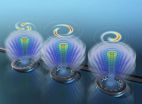Researchers made this discovery during a secondary analysis of a phase Ib randomized, placebo-controlled study of Polyphenon E in a group of 40 women with hormone receptor-negative breast cancer. Katherine D. Crew, M.D., assistant professor of medicine and epidemiology at Columbia University Medical Center in New York, N.Y., presented the data at the 11th Annual AACR International Conference on Frontiers in Cancer Prevention Research, held here Oct. 16-19, 2012.
"Many preclinical studies have looked at epigallocatechin-3-gallate, or EGCG, which is one of the main components of green tea, and the various possible mechanisms of its action against cancer, but it is very difficult to do those same kinds of studies in humans," Crew said. "This study was too small to say for sure if green tea will prevent breast cancer, but it may move us forward in terms of understanding antitumor mechanisms."
In the primary analysis, presented at last year's Frontiers in Cancer Prevention Research meeting, 40 women were randomly assigned to 400 mg, 600 mg or 800 mg of Polyphenon E or to placebo twice daily for six months. During that time, researchers collected blood and urine samples from participants at baseline and at two, four and six months.
In this secondary analysis, Crew and colleagues used the blood and urine samples to examine biologic endpoints, such as inflammatory proteins, growth factors and lipid biomarkers, which might point to the mechanism of action behind green tea extract. Biomarker data were available for 34 of the 40 patients.
Women assigned to the extract had an average 10-fold increase in green tea metabolites compared with placebo. In addition, they had a significant reduction in hepatocyte growth factor levels at two months compared with women assigned to placebo. However, at the four-month and six-month follow-ups, the difference was no longer statistically significant.
The researchers also identified a trend toward decreased total serum cholesterol and decreased vascular endothelial growth factor in women assigned to the extract.
According to Crew, it is still too early to recommend green tea extract to prevent breast cancer. Currently, researchers are conducting several ongoing studies to explore the use of oral green tea extract in high-risk women for the primary prevention of breast cancer.
### Follow the AACR on Twitter: @aacr #aacr Follow the AACR on Facebook: http://www.facebook.com/aacr.org
About the American Association for Cancer Research Founded in 1907, the American Association for Cancer Research (AACR) is the world's first and largest professional organization dedicated to advancing cancer research and its mission to prevent and cure cancer. AACR membership includes more than 34,000 laboratory, translational and clinical researchers; population scientists; other health care professionals; and cancer advocates residing in more than 90 countries. The AACR marshals the full spectrum of expertise of the cancer community to accelerate progress in the prevention, biology, diagnosis and treatment of cancer by annually convening more than 20 conferences and educational workshops, the largest of which is the AACR Annual Meeting with more than 17,000 attendees. In addition, the AACR publishes seven peer-reviewed scientific journals and a magazine for cancer survivors, patients and their caregivers. The AACR funds meritorious research directly as well as in cooperation with numerous cancer organizations. As the scientific partner of Stand Up To Cancer, the AACR provides expert peer review, grants administration and scientific oversight of team science and individual grants in cancer research that have the potential for near-term patient benefit. The AACR actively communicates with legislators and policymakers about the value of cancer research and related biomedical science in saving lives from cancer.
For more information about the AACR, visit www.AACR.org.
Abstract:
A73 Evaluating tissue biomarker effects of an oral green tea extract, Polyphenon E, using reverse phase protein array in women with operable breast cancer. Kimberly A. Ho1, Davida Kornreich1, James A. Cardelli2, Jerry McLarty2, Dawn L. Hershman1, Matthew Maurer1, Kevin Kalinsky1, Bret Taback1, Hanina Hibshoosh1, Tao Su1, Susan F. Refice1, Katherine D. Crew1. 1Columbia University Medical Center, New York, NY, 2Louisiana State University Health Sciences Center, Shreveport, LA.
Background: Numerous epidemiologic studies and experimental data support potential anti-tumor effects of green tea and its main component, epigallocatechin-3-gallate (EGCG), in breast cancer. However, there is limited data on the effects of tea catechins on breast cancer in human intervention trials. The purpose of this study is to evaluate tumor proteomic changes after short-term pre-surgical administration of an oral green tea extract, Polyphenon E (Poly E), in women with operable breast cancer using reverse phase protein array (RPPA).
Methods: This is a phase II single-arm open-label trial of oral Poly E 800 mg daily for 2-4 weeks in women with histologically-confirmed breast cancer on core biopsy who were scheduled for surgical resection. Formalin-fixed paraffin-embedded (FFPE) tumor tissue from the diagnostic core biopsy (pre-treatment) and surgical resection (post-treatment) were analyzed for expression of the Ki-67 proliferation index, estrogen receptor (ER), progesterone receptor (PR), and HER2 by immunohistochemistry (IHC). Protein was extracted for RPPA analysis of 161 proteins, including components of the PI3K/AKT and MAPK pathways. Women were matched by age, breast cancer stage, ER/PR/HER2 status, and time interval between breast biopsy and surgery to untreated historical controls. Paired t-test was used to calculate changes in protein markers before and after Poly E treatment and 2-sample t-test to compare biomarker changes in the treatment and no treatment groups. All statistical analyses were 2-sided and performed using SAS version 9.1.
Results: From Feb 2008 to Sept 2009, 25 women were enrolled and 21 were evaluable. Median age: 50 years (range, 33-71); White/Hispanic/Black (%): 44/48/7; Stage 0/I/II/III (%): 11/48/30/11; hormone receptor +/- (%): 85/15. Mean duration on Poly E was 20 days (range, 13-36). We demonstrated significant correlations between RPPA and IHC for Ki-67 (0.46, P END
